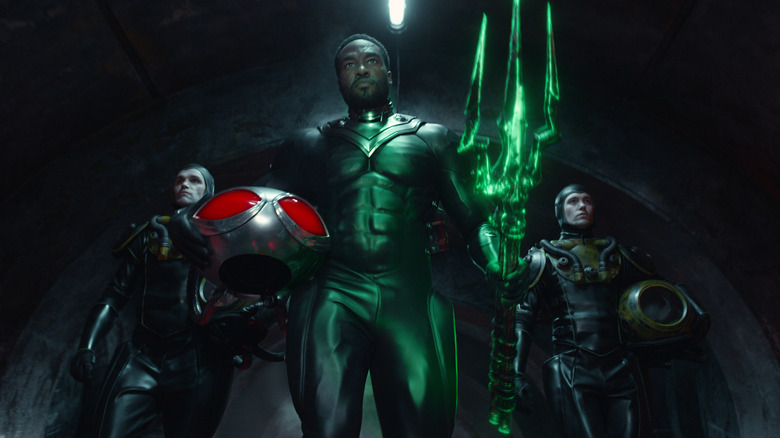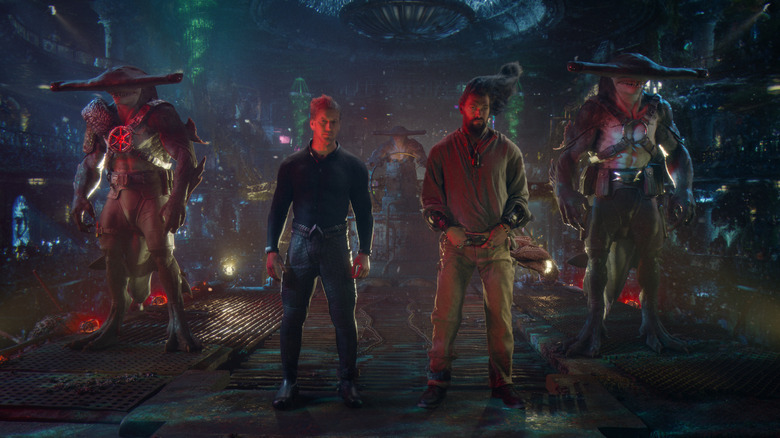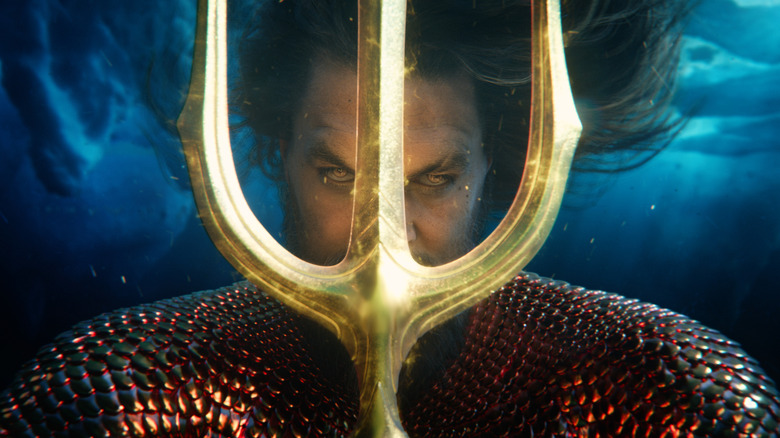Aquaman And The Lost Kingdom Is Actually About A Serious, Real World Problem
Heads-up, landlubbers. This article contains major spoilers for "Aquaman and the Lost Kingdom."
Let's talk about trash. No, that's not a reference to the pretty dismal reviews for the latest "Aquaman" sequel, which has ended the DC Extended Universe with more of a whimper than a bang. (Although /Film's review by Rafael Motamayor generally lands on the more positive end of the spectrum.) Rather, this is in reference to one major oversight from the 2018 movie that director James Wan has finally set right this time around. For all its fairly obvious missteps, "The Lost Kingdom" actually improves on its predecessor in one specific way that few DC films — and superhero movies in general — have ever even attempted. And it has to do with pesky humans making this world a worse and worse place to live by the minute.
Despite what a vocal minority of fans might have you believe (or, in the most recent example, a higher-up like Bob Iger), there's no conceivable universe where an "Aquaman" movie didn't at least attempt to address real-world issues like climate change and ocean pollution. While this certainly applies to the first film, that script really only ever paid lip service to the idea that humanity was actively poisoning the environment for Atlanteans and all others dwelling beneath the waves. It's treated as a means to an end: an obvious bit of motivation for the wannabe Ocean Master Orm (Patrick Wilson) to fuel his hatred of the surface world and, in particular, his "half-breed" half-brother Arthur Curry (Jason Momoa) that's discarded less than halfway through the story. Otherwise, nothing is ever actually done to mitigate this problem or even acknowledge its ongoing harm.
Thankfully, "Aquaman and the Lost Kingdom" tackles this theme head-on from beginning to end.
A mess of our own making
You know, maybe if we learned to pick up after ourselves every now and then while also curbing carbon emissions, we wouldn't find ourselves in the predicament of a demon-possessed pirate releasing all the world's supply of orichalcum and hastening the demise of our planet. It's only by the grace of the film gods that a hero like Aquaman was willing to risk it all to save his family, defeat his foes, and deliver an impassioned speech in front of the United Nations and the world at large to shame humanity into finally doing the right thing. Ever think about that?!
In all seriousness, it's genuinely refreshing to see "The Lost Kingdom" actually live up to the promise of the 2018 film — in this one respect, at least. What could've been nothing more than an excuse to throw Orm and Arthur together in a Thor/Loki-like dynamic instead feels relevant and vital for the environmentally-conscious among us (which really should be all of us, but I digress). In the main plot, Black Manta (Yahya Abdul-Mateen II) still remains dead-set on exacting revenge upon Aquaman for allowing his father to die in the first film, but the twist that the influence of the Black Trident essentially possesses him with the spirit of fallen Atlantean King Necrus ("Game of Thrones" scene-stealer Pilou Asbæk) allows for the real threat of the movie — irreversible climate change — to rear its ugly head. Manta travels to Antarctica to basically put glacial melting on overdrive, thus freeing Necrus from the icy prison that King Atlan (Vincent Regan) condemned him to all those centuries ago.
This threat isn't mere window dressing, mind you. It's the stakes of the entire movie. And, best of all, Aquaman actually does something about it.
Be the change you want to see in the world!
Is the central message of "Aquaman and the Lost Kingdom" a little heavy-handed? Sure. But if you're paying for superhero movies in the hopes of subtlety, my friend, you might be barking up the wrong tree. (Swimming down the wrong trench? Don't look at me, I don't know what the aqua-equivalent would be.)
For once, all the existential problems introduced in a superhero movie aren't resolved by kicking and punching a villain into submission. There's plenty of fisticuffs, don't get me wrong, but that's only how our heroes deal with the physical threat of Black Manta and Necrus' army of water-zombies. Not only does the climate crisis become a recurring concern throughout the first two acts, but Wan and writer David Leslie Johnson-McGoldrick (along with Thomas Pa'a Sibbett, who gets a "Story by" credit) go one step further by making sure the movie doesn't end without circling back to this. Yes, it's objectively hilarious that Atlantis reveals itself to the world and promptly gets a seat at the table of the UN. It's even more ridiculous that, as King of Atlantis, Aquaman uses the opportunity to issue a speech broadcasted to the entire world urging them to pool their resources with Atlantis to solve the crisis — only to end his impassioned plea with a literal mic drop and one last "Yeah-yuh, I'm Aquaman!" for the road. But the movie's heart is in the right place and that counts for something.
It's a shockingly optimistic end to the DCEU given its early trajectory, but a welcome one nonetheless. Superheroes are meant to lead us towards a better future. Who knew that, of all the heroes, Aquaman would be the most successful?
"Aquaman and the Lost Kingdom" is now in theaters.


